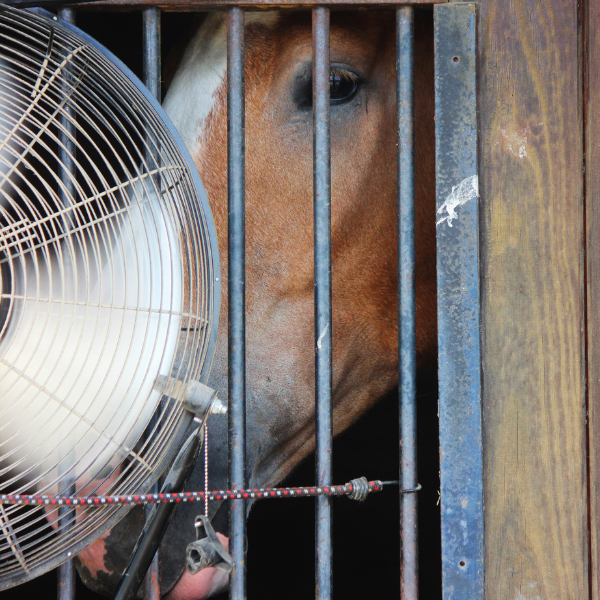The mild spring temperatures we’ve experienced recently here in the Mid-South will soon give way to summer’s extreme heat. Caring for horses during hot weather brings about a different set of challenges. However, there are some things you can do in and around the barn this summer to ensure your horse is comfortable.
First, provide unlimited access to clean water. Ideally, the temperature of your water should not exceed 64 degrees. However, for those of us with metal or black, plastic water troughs in the pasture, the sun heats the water quickly. Consider freezing a couple of milk jugs filled with water to place in your trough. These will act like ice cubes and help regulate your horse’s temperature from the inside out.
Another way to ensure your horse is adequately hydrated this summer is to give your horse an electrolyte supplement. Electrolyte paste is a fast-acting way to ward off mild dehydration. Electrolyte powder can be placed in horses’ feed or even dissolved in the water trough. A mineral block or salt lick will also replace vital nutrients and minerals, as well as encourage your horses to drink this summer. As always, consult your veterinarian before giving any supplements.
As mentioned in the “Warming Up and Cooling Down in Hot Weather” article, be mindful about what time you ride and work your horse this summer. As a general rule, you can determine if it is too hot to ride by adding the actual air temperature to the humidity and get a horse heat index number. For example, on a 95 degree day this summer with a relative humidity of 85%, the horse heat index (temp. + humidity) would be 180 and warrants you to use extreme caution. Normal cooling is almost ineffectual with a heat index of 180 or greater, and therefore, riding is a no go. A heat index greater than 150 also requires exercising caution; watch for signs of heat stress in your equine, and you should still hold off on that ride. 130 and below on the horse heat index indicates your horse can keep itself cool, and you can enjoy a summer ride.
Julia Whitehead, local trainer and rider, suggests riding in the early morning or late in the afternoon to beat the heat. “A shady spot to ride is always preferable, so I will often stick to slower paced trail rides in the shade if possible,” she states. If it is extremely hot, Julia may choose to work on groundwork or slower paced work under saddle. On a hot, humid day, she “avoids extensive trotting and loping to keep from overheating the horse.” After a ride, she always hoses the horse down with cold water and puts it under a fan or in a shady spot to dry off.
Turnout time may need to be adjusted as well this summer. If you do turn out in the middle of the day, or if your horses live outside, be sure there is shade in your pasture to provide relief from the scorching heat. White or lighter skinned horses, or those with pink muzzles are prone to sunburn. Use a full fly mask on your horse as a physical barrier from the sun. If there are still pink or light areas exposed, human sunscreen can be applied to these vulnerable areas. Be sure to ok the use of human sunscreen on your horse with your vet, but, generally, those without para aminobenzoic acid are safe for horses on small areas of the body. There are also specially developed equine sunscreens available on the market. Just like when we use sunscreen ourselves, it will need to be reapplied every couple of hours, according to the directions.
If possible, use fans (misting fans are even better) to keep your horse cool in the stall. Absorbing water through its skin will help keep your equine from sweating, thus further losing fluids and working against dehydration. Open any doors and windows in the barn to allow fresh air in. The hot, humid air will rise and continue to draw in yet more fresh air.
If you need to transport your horse, try to haul during the early AM or late evening as well. Remember to open any trailer vents to maximize air flow and offer water to your equine frequently. Doing your best to keep your horse comfortable this summer should result in a happy equine.









